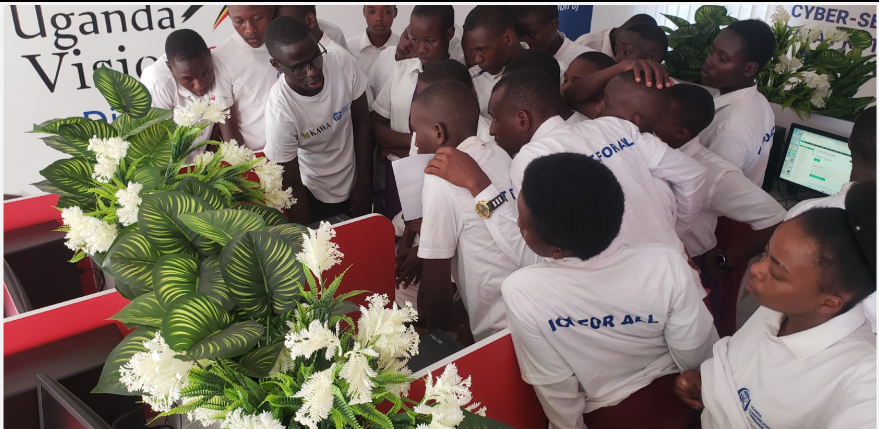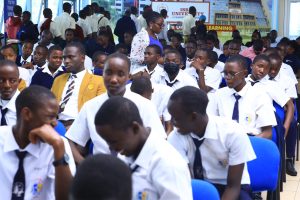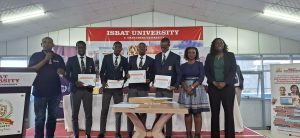Kambuga Secondary School Embraces Digital Innovation

On June 10, 2025, a significant step towards digital empowerment was taken at Kambuga Secondary School in Kanungu District with the successful launch of its ICT Club. This initiative, a collaborative effort between the Uganda Communications Commission (UCC) and Kisubi Associated Writers Agency (KAWA), is part of a broader national campaign to integrate ICT into education. The club aims to foster innovation, creativity, and practical digital skills among Ugandan learners, serving as a vital platform for students to explore coding, content creation, and real-world problem-solving. The launch event was facilitated by Noah Okwalinga, with Mr. Atuheire Denis serving as the club’s Patron and Mr. Arinatwe Godfrey as the Headteacher. For further inquiries, Mr. Atuheire Denis can be contacted at atuheiredenis@gmail.com.
The launch attracted a total of 23 students, spanning from Senior One to Senior Six, all of whom actively registered their attendance and participated enthusiastically in the day’s events. These students demonstrated a strong interest in leveraging ICT tools to enhance their learning and contribute positively to their communities. To ensure effective leadership and sustained activity, a student executive team was elected to guide the club’s operations. The elected leaders include: Akankwasa Muej (S.5) as President, Ahamukwera Cedric (S.5) as Vice President, Kikiriza Innocent (S.3) as Secretary, and Akanjona Trust (S.5) as Speaker. These dedicated leaders will be responsible for organizing club sessions, mobilizing their peers, liaising with teachers and partner organizations, and compiling comprehensive monthly activity reports. The club launch also showcased a commendable commitment to inclusivity, with a gender distribution of 15 male students and 8 female students, reflecting national efforts towards digital equity.
The session commenced with an engaging presentation that elucidated the purpose, structure, and overarching vision of the ICT Club. Students were introduced to the vast possibilities that ICT offers across education, entrepreneurship, and community transformation. Following this, they were guided through a practical demonstration of the KAWA CONNECT offline resources, which encompass a rich array of educational videos, interactive simulations, digital textbooks, and various other offline learning tools. The hands-on technical sessions formed a crucial part of the day, where students actively participated in installing and exploring Visual Studio Code for basic programming, creating simple mobile applications using MIT App Inventor, and practicing block-based coding with Scratch, particularly beneficial for beginners. Throughout these activities, students engaged in lively discussions about how these newly acquired tools could be applied to solve real-life challenges within their school environment and broader communities.
Despite the overall success of the launch, one significant challenge encountered was the absence of a projector. This limitation made it difficult to display presentations effectively and to relay essential video messages, such as the one from the KAWA Executive Director. Nevertheless, the team demonstrated remarkable adaptability and creativity, ensuring that students could still follow the activities closely and gain valuable insights.
To enhance the functionality and ensure the long-term sustainability of the ICT Club, several key recommendations have been put forward. Firstly, there is a clear need for additional ICT infrastructure, including more laptops, routers, and reliable backup power supplies, to facilitate extensive hands-on learning. Secondly, continued virtual and in-person mentorship from KAWA and UCC is deemed essential to nurture the learners’ skills and maintain their enthusiasm. Lastly, it is recommended that the newly elected student leaders receive specific training on how to prepare and submit detailed monthly activity reports, outlining club sessions, innovations, and any challenges faced.
In conclusion, the ICT Club is now officially launched and fully operational. With a committed leadership team, engaged learners, and a robust support system from UCC and KAWA, the club is poised to become a vibrant hub of digital innovation and creativity. Students will not only acquire proficiency in using ICT tools but will also learn to effectively solve community problems and develop meaningful digital projects that align with Uganda’s national development goals. Special thanks are extended to Mr. Atuheire Denis, the club patron, for his dedicated coordination, and to Mr. Arinatwe Godfrey, the Headteacher, for his warm welcome and unwavering support. We also express our deep appreciation to UCC for championing ICT in education and to KAWA Uganda for their consistent technical guidance and invaluable resources. The students themselves conveyed their heartfelt gratitude to both UCC and KAWA, emphasizing that the training and resources have significantly uplifted the status of ICT in their school and opened their minds to exciting new possibilities






